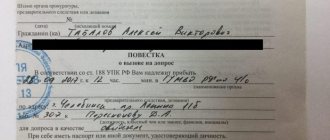Confession:
- may act as a reason to begin checking a report of a crime and subsequently initiate a criminal case (clause 2, part 1, article 140 of the Code of Criminal Procedure of the Russian Federation);
- is a circumstance mitigating the punishment of the perpetrator of a crime (clause “and” part 1 of article 61 of the Criminal Code of the Russian Federation). At the same time, surrender must be recognized as an independent circumstance mitigating punishment, without replacing it with active assistance in solving or investigating a crime or recognizing it as an integral part of it. At the same time, surrender is also an essential condition for release from criminal liability in connection with active repentance (Article 75 of the Criminal Code of the Russian Federation).
The importance of correctly determining a confession is emphasized by the fact that if it is present and there are no aggravating circumstances, the court, when imposing a sentence, is obliged to apply the provisions of Part 1 of Art. 62 of the Criminal Code of the Russian Federation that the term or amount of punishment cannot exceed two-thirds of the maximum term or amount of the most severe type of punishment provided for by the corresponding article of the Special Part of the Criminal Code of the Russian Federation.
An appeal from a person who has committed a crime and is evading investigation or trial or from paying a court fine imposed in accordance with Art. 76.2 of the Criminal Code of the Russian Federation, with a confession, the suspended statute of limitations for bringing to criminal responsibility and serving a sentence is resumed (Part 3 of Article 78, Part 2 of Article 83 of the Criminal Code of the Russian Federation).
In addition, a continuing crime is considered completed due to the action of the guilty person himself, aimed at stopping the crime. The statute of limitations for criminal prosecution in relation to ongoing crimes is calculated from the time of their termination at the will or against the will of the perpetrator, including in the case of confession.
Confession. Definition of the concept
In existing explanatory dictionaries the following definitions of confession are given:
Confession is a voluntary statement about the commission of a crime made to the body of inquiry, investigator, prosecutor or court (judge) before being brought in as an accused or suspect. Considered as a circumstance mitigating responsibility (Big Encyclopedic Dictionary. 2000).
Confession is a voluntary personal appeal (appearance) of a person who has committed a crime, with a statement about it to the bodies conducting the inquiry, investigation, to the prosecutor's office, to the court with the intention of bringing oneself into the hands of justice. In the criminal procedural law of the Russian Federation, surrender is one of the reasons for initiating a criminal case. In the event of a confession, the identity of the person who has appeared is established and a protocol is drawn up, which sets out in detail the statement made: where, when and under what circumstances the crime was committed, what data confirms it, the motives that prompted the person to confess, etc... (Big Legal Dictionary. - M.: Infra-M. A. Ya. Sukharev, V. E. Krutskikh, A. Ya. Sukhareva. 2003).
Confession is a voluntary appeal to law enforcement agencies with recognition of a crime committed. Voluntary appearance presupposes that the guilty person realizes that he can continue to evade criminal responsibility, but he decides to confess to the authorities. In this case, it is assumed that the crime committed is either not known, or is known, but the perpetrator is wanted by law enforcement agencies. Confession, in addition to the condition for release from criminal liability upon active repentance (Article 75 of the Criminal Code), is considered in criminal law as a circumstance mitigating punishment (clause “and” part 1 of Article 61 of the Criminal Code) ... (Dictionary of basic criminal offenses) procedural concepts and terms. - Legal technologies. A. M. Baranov, P. G. Marfitsin. 2011).
The Plenum of the Supreme Court of the Russian Federation defined the concept of surrender as a voluntary report of a person about a crime committed by him or with his participation, made in writing or orally (clause 29 of the Resolution of the Plenum of the Supreme Court of the Russian Federation of December 22, 2015 N 58 “On the practice of appointment by the courts of the Russian Federation criminal punishment").
Statement of confession
A statement of confession is a voluntary report of a person about the crime he has committed (Article 142 of the Code of Criminal Procedure of the Russian Federation).
According to clause 2, part 1, art. 140 of the Code of Criminal Procedure of the Russian Federation, confession is recognized as a reason for initiating a criminal case and, accordingly, a reason for starting a preliminary investigation.
In fact, a confession is a type of statement about a crime, the peculiarity of which is that its author reports his own criminal actions to law enforcement agencies.
A message about a committed or impending crime received from other sources
A message about a committed or impending crime received from other sources is any official source of information received by an official in the course of his official activities from any individual or legal entity. These may include messages contained in the media; information obtained during any inspection, operational search activity, road patrol service, etc. The data is drawn up in a report from an official about the detection of signs of a crime, which is the reason for initiating a criminal case. The report is compiled by employees of operational units, other bodies of inquiry, and preliminary investigation. Messages from enterprises, institutions, organizations and officials must be made in writing and certified by the seal and signatures of managers.
Voluntariness as a sign of surrender. Confession during the investigation
As already stated above, a confession is considered not only as a reason for initiating a criminal case, but also as a circumstance mitigating punishment.
Voluntariness of surrender
A mandatory sign of surrender is its voluntariness , the assessment criteria for which are given by the Plenum of the Supreme Court of the Russian Federation:
“A statement about a crime made by a person in connection with his arrest on suspicion of committing this crime cannot be recognized as voluntary. A person’s admission of guilt in committing a crime in such cases may be taken into account by the court as another mitigating circumstance in accordance with Part 2 of Article 61 of the Criminal Code of the Russian Federation or, if there are grounds for this, as active contribution to the disclosure and investigation of the crime” (clause 29 of the Resolution of the Plenum of the Supreme Court of the Russian Federation dated December 22, 2015 N 58).
Thus, in order to come to a conclusion about the voluntary nature of the actions of the perpetrator when giving a confession, it is necessary to establish his free will about this and the possibility of choosing other options for his behavior, and not reporting a crime under pressure from evidence.
Only such a citizen’s statement regarding the crime can be considered a confession
- not known to law enforcement agencies, in other words, unregistered;
- known to law enforcement agencies, but undisclosed, when the person who committed it was not identified through investigation and there was neither a suspect nor an accused in the case, and the confession was made solely on a voluntary basis.
Therefore, a confession during the investigation of the crime cannot be ruled out.
For example, a person interrogated as a witness in a criminal case of theft talks about the commission of this crime, the method and time of its commission, and who he sold the stolen property to. Moreover, at the time of giving this testimony, this person was neither a suspect nor an accused in the case, and law enforcement officers were not aware of the circumstances of the theft. In this case, a confession must be recognized, but not as a reason to initiate a criminal case (since a preliminary investigation into the case has already been carried out), but as a circumstance mitigating the punishment.
The initiative to confess must come from the applicant himself. Such a “confession” will not be a mitigating circumstance when a wanted defendant, who knew that he was wanted, came to the police with a statement that he had committed a crime.
A report of a crime made under the influence of presented evidence of a person’s guilt in committing a crime, after the person has been detained as a suspect, will not constitute a confession; when initiating a criminal case against a specific person.
A statement about a committed crime made by a citizen who has not yet been brought as an accused, but has already been interrogated in the case in an incriminating style and confessed under the pressure of evidence, cannot be called a confession.
Grounds for initiating criminal proceedings
Along with the reason, another mandatory condition for initiating a criminal case is the basis associated with the presence of sufficient data indicating signs of a crime (Part 2 of Article 140 of the Code of Criminal Procedure of the Russian Federation).
The basis for initiating a criminal case is the presence of sufficient data indicating the signs of a crime that relate to the object of the crime and the objective side of the crime, if the case is initiated upon the commission of a crime. If a criminal case is initiated against a specific person, then information about the subject and the subjective side of the crime is required. There are certain crimes for which cases are always brought against a specific person. These include:
- non-payment of funds for the maintenance of children or disabled parents - Art. 157 of the Criminal Code of the Russian Federation;
- refusal to provide information to a citizen - Art. 140 of the Criminal Code of the Russian Federation;
- disclosure of the secret of adoption - Art. 155 of the Criminal Code of the Russian Federation;
- abuse of power and official authority - Articles 201, 285 of the Criminal Code of the Russian Federation;
- receiving a bribe - art. 290 of the Criminal Code of the Russian Federation;
- giving a bribe - Art. 291 of the Criminal Code of the Russian Federation, etc.
From the moment a criminal case is initiated, such a person acquires the status of a suspect (Part 1 of Article 46 of the Code of Criminal Procedure of the Russian Federation) and has the right to receive a copy of the resolution to initiate a criminal case.
Confession form
A statement of confession can be made either in writing or orally . An oral statement is accepted and entered into the protocol in the manner prescribed by Part 3 of Art. 141 of the Code of Criminal Procedure of the Russian Federation (Part 2 of Article 142 of the Code of Criminal Procedure of the Russian Federation). The protocol must contain information about the applicant, as well as documents identifying the applicant.
If necessary, explanations can be obtained from the person who has submitted a written statement of confession after his identity has been established in the general manner, but only after a protocol of surrender has been drawn up.
“According to Part 2 of Art. 142 of the Code of Criminal Procedure of the Russian Federation, a statement of confession can be made both in writing and orally. Failure to file a confession statement as an independent procedural document does not affect the consideration of this circumstance as a mitigating punishment" (clause 5 of the Review of Judicial Practice of the Supreme Court of the Russian Federation No. 4 (2016)"; approved by the Presidium of the Supreme Court of the Russian Federation on December 20, 2016).
If the statement of confession itself contains sufficient grounds for initiating a criminal case and does not require a pre-investigation check, such a case must be initiated immediately, and the person who confessed must be interrogated as a suspect.
A number of procedural scientists believe that a confession can be carried out by sending a statement of guilt by a person who wants to expose his criminal actions by mail , telegraph or using other means of communication, and even by transmitting a written statement of confession through others persons
But despite the fact that the Code of Criminal Procedure of the Russian Federation does not really contain instructions regarding the personal presence of a person when declaring information incriminating his criminal acts, it should be borne in mind that the term “appearance” means “arriving somewhere”:
- appear - come, arrive somewhere for some official need (Ushakov’s Explanatory Dictionary)
- appear - arrive, come somewhere (Ozhegov’s Explanatory Dictionary)
That is, the legislative formulation “confession” presupposes a personal, direct appeal by a person who wants to report a crime he has committed to the competent government authorities.
Exemption from punishment
By contacting the police department and having a statement with him, the criminal significantly increases the likelihood of completely avoiding criminal punishment under certain conditions.
They are spelled out in detail in Art. 75 of the Criminal Code of the Russian Federation:
- a criminal offense of mild or moderate gravity was committed for the first time;
- there was a notification to the police about participation in the crime through a confession;
- the culprit contributed as much as possible to the investigation and assisted the investigation;
- all damage caused by the criminal offense was compensated in full;
- reconciliation with the victim (Article 76 of the Criminal Code of the Russian Federation);
- compulsory measures of educational influence on minors (Article 90 of the Criminal Code of the Russian Federation);
- loss of public danger, including that expressed in a lawful way of life in order to atone for guilt.
Liability can also be avoided if a lot of time has passed since the commission of unlawful activity (Article 78 of the Criminal Code of the Russian Federation).
If the deadlines specified in the article have expired, then after contacting the police by turning himself in, the person will be released from criminal punishment.
Special mention should be made of the notes to the following articles of the Criminal Code of the Russian Federation, under which a person can avoid punishment by contacting the police with the application under consideration: 126, 204-206, 208, 222-223, 228, 275, 291, 307.
Confession and explanation of rights. Exclusion of confession from the list of evidence
In cases where, during the verification of a report of a crime in the manner provided for in Art. 144 of the Code of Criminal Procedure of the Russian Federation, the defendant submitted a written or oral statement to surrender and the prosecution refers to the information specified in this statement as one of the evidence of his guilt, the court must check, in particular, whether the defendant was explained when accepting such a statement from him with taking into account the requirements of Part 1.1 of Art. 144 of the Code of Criminal Procedure of the Russian Federation the right not to testify against oneself, to use the services of a lawyer, to file complaints against actions (inaction) and decisions of preliminary investigation bodies in the manner established by Chapter. 16 Code of Criminal Procedure of the Russian Federation; whether the possibility of exercising these rights was ensured (clause 10 of the Resolution of the Plenum of the Supreme Court of the Russian Federation dated November 29, 2016 N 55 “On the judicial verdict”).
Thus, despite the absence in Art. 144 of the Code of Criminal Procedure of the Russian Federation, a direct reference to a confession, taking into account that it, in essence, is a message about a crime committed and a reason for initiating a criminal case, subject to verification, the Plenum of the Armed Forces of the Russian Federation extended the provisions of Part 1.1 of Art. 144 of the Code of Criminal Procedure of the Russian Federation for surrender.
If the prosecution at a court hearing refers to the information specified in the confession as one of the incriminating evidence of the guilty party, the court must verify compliance with these requirements. Otherwise, this information cannot be considered admissible evidence.
In most cases, applications for the confession of suspects contain an explanation of the provisions of Art. 51 of the Constitution of the Russian Federation on the right not to testify against oneself, the right to appeal against the actions of the investigator and a personally written refusal to provide the services of a defense lawyer.
If the defendant refuses the information specified in the confession given in the absence of a defense lawyer, the courts exclude the appearance from the list of evidence on the basis of clause 1, part 2 of Art. 75 of the Code of Criminal Procedure of the Russian Federation, in fact equating the information contained in it with the testimony of a suspect given during pre-trial proceedings in a criminal case in the absence of a defense lawyer, including cases of refusal of a defense attorney, and not confirmed by the suspect accused in court.
Do you need a lawyer?
Sometimes those guilty of a crime are forced to write a confession, citing a mitigation of punishment and a promise to put in a good word with the prosecutor. One can speak forever about the qualifications and skills of such police officers, but, nevertheless, coercion to write this document in practice is a fairly common occurrence. How to deal with this? Request a lawyer.
Always demand a lawyer, even if a confession has already been written. Of course, the lawyer will have to pay handsomely extra, because coping with a confession that has already been written (albeit under duress) is hellish work and a sea of problems.
The lawyer will help even after the truth is established and the confession is cancelled. In the vast majority of cases, this can be done, since this recognition will not have legal force.
The judicial panel will consider the application only in cases where it is written at its own request, without pressure from third parties (clause 1 of Article 142 of the Code of Criminal Procedure of the Russian Federation). Cases are especially good when a person is forcibly involved in a criminal case: the judge will have doubts, and the lack of evidence from the investigation will additionally help the innocent person establish the truth.
On the other hand, if a person made a confession under duress, but he is still a criminal in an existing criminal case, this is unlikely to help. It is enough for investigators to discover at least indirect evidence of guilt, and the chances of mitigating the punishment will disappear instantly.
You should seek the help of a lawyer even in situations where handling this document is a completely voluntary decision. To do this, you must come to the police station, declare your desire to make a confession and be sure to require the presence of a lawyer when drawing up (or come to the station with your own lawyer). Refusal by police officers to provide legal protection is regarded as a violation of the law (Clause 1 of Article 48 of the Constitution of the Russian Federation) with corresponding consequences.
It is possible to write a statement in advance, but legal assistance is still recommended in order to prepare this confession correctly and not cause unnecessary problems.









